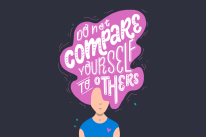“We come to love not by finding a perfect person, but by learning to see an imperfect person perfectly.” ~Sam Keen
I heard this story the other day about the collection of homes called Favelas surrounding Rio De Janeiro.
If you aren’t familiar with them, they are a large collection of small run-down homes built on the side of the hills surrounding the city. They scatter and protrude across the landscape like paper litter in the tall grass along the highway.
The conditions can be poor, and unsanitary, often with raw sewage running down the side of the hill where the houses are built. Many people live right across from houses that sell drugs or prostitution. Even reaching the houses is difficult, with the only options being a treacherous road or walking up as many as 800 stone steps.
When a man who was giving a tour of the area was asked if most people living there are poor and have no choice but to live there, the reply came back “No.”
Many people work, make a descent living, and choose to live here. In fact, he explained, he himself lives there. That begged the question: why not move out if you can?
The man answered, “Because my life is here, my friends, my family. I love it here.”
I thought to myself, how could anyone love it there? How could anyone love those houses, love that neighborhood, those living conditions?
But then I thought, what does it mean to love something? What does it mean to be loved by someone?
You see, growing up, and most of my life up to this point, I don’t think I’ve understood this. Love is, for most of us, what the world says it should be because that’s what we’ve been conditioned to believe. That’s what we’ve been taught.
Love is a frantic kiss and a firm embrace at the end of a Hollywood movie.
Love is what you should feel when you see a beautiful model wearing exquisite clothing rocketing away on her motorcycle in a crisply baked marketing ad.
Love is what you want to feel, what you want to have, how you want to look, and how others should look. If I had that, if I looked that way, if I had that girl for a girlfriend, I would love it—because I would be loved.
I think that’s what I always thought. I had this idea in my mind of what was needed to be loved—a list of requirements defined by what I was taught and what I thought love was.
I also had a pre-defined idea of what love would be like when it finally came knocking on my door. There would never be any run-down shacks with raw sewage in my life. That’s not what made sense. Love would never be something with as many flaws and imperfections as that.
After that thought, there was another, this one deep inside my consciousness, just barely a whisper: Hey wait, what about me? I’m not perfect. I don’t even drive a motorcycle. How will I be loved?
That thought strangely reminded me of a pair of shoes I once had. These shoes weren’t anything super special.
They were comfortable; they kept me warm and looked pretty good doing it. The older they got, the worse they looked. There were scuff marks in the leather, and the soles were worn out, but the shoes actually got more and more comfortable as the years went by.
I knew everything about these shoes: how they would react if I stepped in a puddle, how much snow I could walk in, if they would slip on ice.
Other people would comment on how bad they were starting to look, but they still looked pretty good to me. Sure I bought other shoes, ones that had a new style and performed better, but I still preferred that old pair of shoes.
The older they got, the more I admired them. They had a strength about them. Not perfect at all, but way more than good enough, and next to impossible to part with.
So is love or finding love about smoothing out all the rough edges in your life and relationships, about looking your best, about acting perfectly and living a life of adventure?
Or is it instead about gathering all that life is, all the gifts it has to offer, along with all its imperfections in a blind tight embrace of understanding?
That’s a freeing thought—one that says it’s okay for us to love ourselves just as we are, even if the world doesn’t see it that way. Just like those houses in Brazil.
Photo by Carmela Nava
About Roger Horn
Roger Horn is a software architect with a passion for writing. He hopes he is lucky enough to write a book someday that may help and inspire others. He writes a blog at Oatmeal in a Bowl.














 Though I run this site, it is not mine. It's ours. It's not about me. It's about us. Your stories and your wisdom are just as meaningful as mine.
Though I run this site, it is not mine. It's ours. It's not about me. It's about us. Your stories and your wisdom are just as meaningful as mine.
Loved your piece, Roger. The analogies are very interesting. Lately I have been feeling like I am running a little empty on love even though my life is full. Your article reminded me re-embrace all the gifts I have in a new light. I remembered that I awhile ago I gave myself the exercise of making a list of all the things I love (other than the obvious family and friends), things like your worn out shoes. I will revisit that list. Its here somewhere!
I so loved this post. Thank you for sharing your words… So many of us tend to fall under the “Hollywood love” spell when life gets rocky, and it’s the first thing to be questioned when we aren’t getting the happily ever after each and every day. So it goes… each day really can be that happily ever after if we look within and see what love really and truly means to us… the simple things in life, not the “passionate, everything is always perfect place.” Blessings.
Wow, another really fantastic post.
Great post! I just told my partner “I love you just the way you are”…or sometimes I’ll add an “as is” after the spoken “I love you”. Because I genuinely do. I’m getting better at applying the same principle to myself which can be a little more challenging – but the “as is” is a powerful reminder to do unto myself as I do unto others.
love’n’light 😉
“The older they got, the more I admired them. They had a strength about them. Not perfect at all, but way more than good enough, and next to impossible to part with.” You just described my husband and our marriage that is potentially ending … helps me to articulate why i’m so not ready to let either go.
Nice article! But how can u be in the “love phase” when people are mean and competative right on your face? Tips please!
Thanks I needed this,right now. Its amazing on this site how often the most needed advice at that time,opens up right before your eyes.
Thank you so much Hilary! It is easy to forget all that is wonderful around us.
I love what you said! I couldn’t agree more! Thanks so much for reading!
Thank you so much!
– Roger
I am so sorry you are going through such a rough time. I’m not an expert, but I really struggle with my expectations of how I believe things should be for me to be happy (all my ideas of what I wanted from my life/relationships), and what I do actually need to be happy. Somewhere in between is an accurate representation of a happy perfect world. But nothing is perfect or totally in our control, and plus we are ever changing things. In the end, I’ve tried to keep focus on what is real around me, embracing the good there and then on the other side, trying to fix the needs that aren’t being met (personal, relationship related etc.). Knowing what you can fix and control, and what you can’t. I so hope this helps. Thanks for reading,
– Roger
That is such a challenge, I think if you can get to a place (I haven’t yet) where you love yourself to a great degree, then you can feel compassion for those people. It will not affect you any longer. You can look at them and know it is their own issue, their own energy speaking, it has nothing to do with you. Good luck, I hope this helps,
– Roger
It is a GREAT site! Thanks so much for reading!
I love the “as is”! I agree, the loving myself “as is” is more difficult. I’m working on that one too! Thanks so much for reading!
– Roger
Thank you Roger! That was helpfull
I love others just the way the are and I hope people will look thru the imperfections and love me just the way I am. We are not perfect but as cliche as this sound, it’s our imperfections that make us perfect. Films and magazines may portray ‘LOVE’ in a certain idealistic way, but in the real world, we just got to accept each other’s imperfections.
Thank you for this wonderful post and a reminder for all of us to love our self and others just the way they are. 🙂
Thanks so much for reading!
– Roger
Thank you so much Roger. I really enjoy your writing style. It is an amazing gift you have. I keep coming back to this post over and over again.
I don’t think it’s question of having ‘a freeing thought—one that says it’s okay to love ourselves just as we are’. I think it’s about whether you are able love yourself in your imperfection after having realised the imperfection of everything. That is, giving yourself permission to love yourself in your imperfection is not the same as actually do so. This article suggests that they are practically one and the same and that after having your moment of enlightenment that it is possible to love imperfection then the hard work has been done. This is delusional. Realising that all people are imperfect and that we all need to be loved brings us no closer to actually loving. If things were that simple I could simply choose to love the whole world.